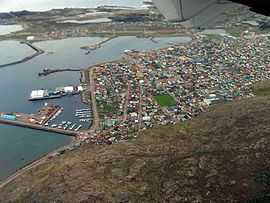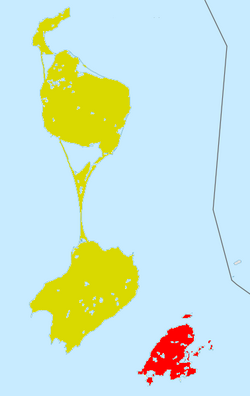Saint-Pierre, Saint Pierre and Miquelon
This article needs additional citations for verification. (March 2021) |
Saint-Pierre (French pronunciation: [sɛ̃ pjɛʁ] ) is the capital of the French overseas collectivity of Saint Pierre and Miquelon, off the coast of the Canadian island of Newfoundland. Saint-Pierre is the more populous of the two communes (municipalities) making up Saint Pierre and Miquelon.
Saint-Pierre | |
|---|---|
 Aerial view of Saint-Pierre | |
 Location of the commune (in red) within Saint Pierre and Miquelon | |
| Coordinates: 46°46′40″N 56°10′40″W / 46.7778°N 56.1778°W | |
| Country | France |
| Overseas collectivity | Saint Pierre and Miquelon |
| Government | |
| • Mayor (2020–2026) | Yannick Cambray[1] |
| Area 1 | 25 km2 (10 sq mi) |
| Population (2019)[2] | 5,394 |
| • Density | 220/km2 (560/sq mi) |
| Time zone | UTC−03:00 |
| • Summer (DST) | UTC−02:00 |
| INSEE/Postal code | 97502 /97500 |
| Elevation | 0–207 m (0–679 ft) |
| 1 French Land Register data, which excludes lakes, ponds, glaciers > 1 km2 (0.386 sq mi or 247 acres) and river estuaries. | |
Etymology
editThe commune is named after Saint Peter, who is one of the patron saints of fishermen.[3]
Geography
editThe commune of Saint-Pierre is made up of the island of Saint-Pierre proper and several nearby smaller islands, such as L'Île-aux-Marins. Although containing nearly 90% of the inhabitants of Saint Pierre and Miquelon, the commune of Saint-Pierre is considerably smaller in terms of area than the commune of Miquelon-Langlade, which lies to its northwest on Miquelon Island.
The main settlement and communal seat is situated on the north side of a harbour called Barachois, which faces the Atlantic Ocean, on the Saint-Pierre Island's east coast. The mouth of the harbour is guarded by a small chain of islands.
History
editJacques Cartier claimed the islands for France in 1536, after they were discovered by the Portuguese in 1520. At the end of the Seven Years' War in 1763, the islands were turned over to Britain, only to be given back to France in 1816.
Saint-Pierre was an outpost used to transport alcohol from Canada to the United States during Prohibition.[4]
Until 1945, there existed a third commune in Saint Pierre and Miquelon: L'Île-aux-Marins. The commune of L'Île-aux-Marins was annexed by the commune of Saint-Pierre in 1945.
Demographics
editThe population of Saint-Pierre in 2019 was 5,394,[2] many of whom are of Basque, Breton, Norman or Acadian descent.[citation needed] All inhabitants in the commune live on the island of Saint-Pierre proper.
Government
editThe commune is led by a mayor and a council. The current mayor, elected in 2020, is Yannick Cambray.[5]
Landmarks
editClose to the centre of the harbour's edge lie the Post office and Custom House (staffed by Directorate-General of Customs and Indirect Taxes), behind which is General Charles de Gaulle Square, the town's centre.
Other prominent landmarks include the St. Pierre Cathedral, to the north of the square, rebuilt from 1905 to 1907 after a major fire, and the Pointe aux Canons Lighthouse, at the mouth of the harbour. Further north, close to the town's former hospital, is the Fronton Zazpiak Bat - an arena for the traditional Basque sport of pelota.
-
General Charles de Gaulle Square
-
Pointe aux Canons Lighthouse in Saint Pierre
-
Fronton Zazpiak Bat arena in Saint-Pierre
Services
editThe François Dunan Hospital Centre (opened in 2011[6]) is the only hospital in Saint Pierre and Miquelon. There is an attached senior home offering health services at the Maison de retraite Eglantine.[7]
Additionally, there is a municipal library, opened in the 1970s, and a municipal sailing school, opened in 1986.[8]
Transportation
editSaint-Pierre Airport, the international airport of Saint-Pierre and Miquelon, is located south of the settlement of Saint-Pierre and is served by Air Saint-Pierre with flights both to Miquelon Airport, five Canadian airports and seasonal service to Paris.
SPM Ferries provides ferry connections with Fortune, Newfoundland, Canada; the port in Miquelon town; and a quay at La Colo on Langlade.[9][10] BPE runs a ferry between Saint-Pierre town and Île aux Marins.[11][12]
Transport around the island itself is either by private car, or by taxi, cars with drivers for hire, or car or bike rental. There are no public buses or railways on Saint Pierre.[13]
Radio and television
edit- Radio Atlantique
- Radio France Outremer
Education
editPublic primary schools in the commune:[14]
- École maternelle Île aux Enfants
- École maternelle Henriette Bonin
- École élémentaire du Feu-Rouge - As of 2016 it had 172 students.[15] It is in the downtown area of the commune and is one nautical cable from the Île aux Enfants nursery.[16]
Lycée-Collège d'État Émile Letournel is the public secondary school in the commune, with junior high, vocational high, and general senior high/sixth-form programmes.
Private schools:
Twin towns
editSaint-Pierre has been twinned with Port-en-Bessin-Huppain (France) since 1976.[21]
See also
editReferences
edit- ^ "Répertoire national des élus: les maires" (in French). data.gouv.fr, Plateforme ouverte des données publiques françaises. 13 September 2022.
- ^ a b Téléchargement du fichier d'ensemble des populations légales en 2019, INSEE
- ^ "Saint Pierre and Miquelon", The World Factbook, Central Intelligence Agency, 2022-05-10, retrieved 2022-05-18
- ^ Wortman, Marc (January 17, 2018). "This Tiny French Archipelago Became America's Alcohol Warehouse During Prohibition". Smithsonian Magazine. Retrieved 2022-05-18.
- ^ Ministère de l'Intérieur. "Résultats des élections municipales et communautaires 2020". interieur.gouv.fr (in French). Retrieved 2022-05-18.
- ^ "Centre Hospitalier François Dunan - Saint-Pierre-et-Miquelon - Hôpitaux Et Cliniques - TLR et ASSOCIES - Architecture Bordeaux". www.tlr-associes.com. Archived from the original on April 9, 2012. Retrieved 2021-12-18.
- ^ "Présentation de la maison de retraite". www.ch-fdunan.fr (in French). Retrieved 2022-05-18.
- ^ "Loisirs et Culture". Ville de Saint-Pierre (in French). Retrieved 2022-05-18.
- ^ "Top Tips for a Visit to Saint-Pierre and Miquelon". Newfoundland and Labrador tourism. Retrieved 2 August 2024.
- ^ "Getting here". Tourism Saint-Pierre and Miquelon. Retrieved 2 August 2024.
- ^ "BPE desserte Île aux Marins (PDF)" (PDF). Mairie Saint-Pierre. Retrieved 2 August 2024.
- ^ "Transports circulation". Ville de Saint-Pierre (in French). Retrieved 2 August 2024.
- ^ "Getting around the Archipelago". Tourism Saint-Pierre and Miquelon. Retrieved 2 August 2024.
- ^ "Établissements Publics - Service de l'éducation nationale de Saint-Pierre et Miquelon". www.ac-spm.fr (in French). Retrieved 2022-05-18.
- ^ "172 élèves. Evaluation en CE2." Ecole élémentaire du Feu Rouge. Retrieved on September 14, 2016.
- ^ "Contact." Ecole élémentaire du Feu Rouge. Retrieved on September 14, 2016. "L'école élémentaire du Feu Rouge est située au centre-ville de Saint-Pierre à une encablure de l'école maternelle l'Ile aux Enfants." Address: "Ecole élémentaire du Feu Rouge 28, rue Louis Pasteur, BP 4234 St Pierre et Miquelon, 97500 "
- ^ "Ecole maternelle privée Saint Louis de Gonzague de Saint pierre (9750020Y)". L'Annuaire de l'éducation (in French). Retrieved 2022-05-18.
- ^ "Ecole élémentaire privée ste Croisine de Saint pierre (9750012P)". L'Annuaire de l'éducation (in French). Retrieved 2022-05-18.
- ^ "Ecole élémentaire privée Sainte -Odile de Saint pierre (9750023B)". L'Annuaire de l'éducation (in French). Retrieved 2022-05-18.
- ^ Home. Collège Saint Christophe. Retrieved on September 14, 2016.
- ^ "Jumelages". Archived from the original on 2019-04-08. Retrieved 2012-06-06.
